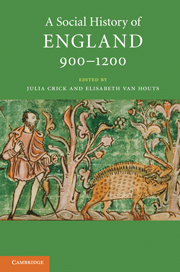Book contents
- Frontmatter
- Contents
- List of figures
- List of maps and tables
- List of contributors
- Acknowledgements
- List of abbreviations
- Map 1 England and its neighbours
- Map 2 England 900–1200
- I Introduction
- I.1 Land use and people
- I.2 Water and land
- I.3 Forest and upland
- I.4 Mineral resources
- I.5 Health and disease
- II.1 Authority and community
- II.2 Lordship and labour
- II.3 Order and justice
- II.4 War and violence
- II.5 Family, marriage, kinship
- II.6 Poor and powerless
- III.1 Towns and their hinterlands
- III.2 Commerce and markets
- III.3 Urban planning
- III.4 Urban populations and associations
- IV.1 Invasion and migration
- IV.2 Ethnicity and acculturation
- IV.3 Intermarriage
- IV.4 The Jews
- V.1 Religion and belief
- V.2 Rites of passage and pastoral care
- V.3 Saints and cults
- V.4 Public spectacle
- V.5 Textual communities (Latin)
- V.6 Textual communities (vernacular)
- VI.1 Learning and training
- VI.2 Information and its retrieval
- VI.3 Esoteric knowledge
- VI.4 Medical practice and theory
- VI.5 Subversion
- Glossary
- Time line 900–1200
- Further reading
- Index
IV.3 - Intermarriage
Published online by Cambridge University Press: 05 June 2012
- Frontmatter
- Contents
- List of figures
- List of maps and tables
- List of contributors
- Acknowledgements
- List of abbreviations
- Map 1 England and its neighbours
- Map 2 England 900–1200
- I Introduction
- I.1 Land use and people
- I.2 Water and land
- I.3 Forest and upland
- I.4 Mineral resources
- I.5 Health and disease
- II.1 Authority and community
- II.2 Lordship and labour
- II.3 Order and justice
- II.4 War and violence
- II.5 Family, marriage, kinship
- II.6 Poor and powerless
- III.1 Towns and their hinterlands
- III.2 Commerce and markets
- III.3 Urban planning
- III.4 Urban populations and associations
- IV.1 Invasion and migration
- IV.2 Ethnicity and acculturation
- IV.3 Intermarriage
- IV.4 The Jews
- V.1 Religion and belief
- V.2 Rites of passage and pastoral care
- V.3 Saints and cults
- V.4 Public spectacle
- V.5 Textual communities (Latin)
- V.6 Textual communities (vernacular)
- VI.1 Learning and training
- VI.2 Information and its retrieval
- VI.3 Esoteric knowledge
- VI.4 Medical practice and theory
- VI.5 Subversion
- Glossary
- Time line 900–1200
- Further reading
- Index
Summary
Throughout history one of the consequences of immigration was marriage between indigenous people and newcomers. Intermarriage, or exogamy, is the sexual union of an indigenous person and a foreigner, sanctioned by society, with the aim to produce offspring. Exogamy can be taken as a sign for assimilation between the two groups, and it can be seen as an agent producing it. In cases where immigration itself followed a military takeover there may have been, as we have seen, amongst the conquerors a surplus of young men looking to settle down with local women (see also Chapter IV.2). For our period intermarriage has been studied particularly by scholars of the Norman Conquest, amongst whom in the 1970s and 1980s Cecily Clark and Eleanor Searle dominated the historiographical debate by arguing that intermarriage after the Norman Conquest must have been substantial enough to explain the widespread change in naming patterns as well as legitimization of landholding by newcomers through marriage to English female landholders. The influential work of Cecily Clark was based on onomastic evidence which pointed to women's insular names surviving longer in the twelfth century than those of English men, who were given Continental names very soon after the Conquest. While acknowledging the absence of statistical evidence, she argued that intermarriage of foreign (French) men to indigenous English women was the most likely explanation for this pattern.
- Type
- Chapter
- Information
- A Social History of England, 900–1200 , pp. 247 - 255Publisher: Cambridge University PressPrint publication year: 2011
- 2
- Cited by



